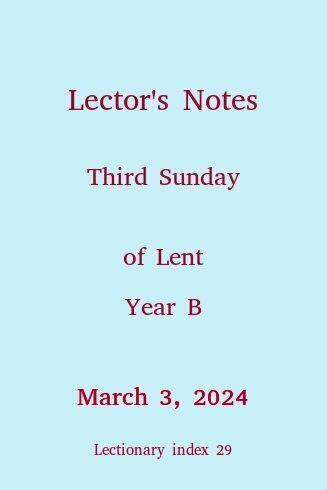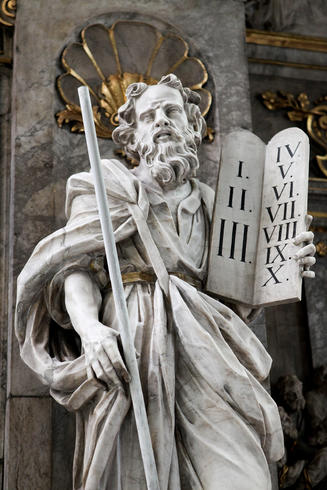

Third Sunday of Lent, Year B, March 3, 2024
The writer of this passage wanted his readers to put themselves in the place of the original Hebrew slaves, just liberated from Egypt's pharaoh. The writer hoped they would imagine themselves hearing this covenant announced for the first time ever.
For the people of ancient Corinth, following the way of Christ was only one of many options. Saint Paul outlines the differences among them.
In only his second chapter, John gets to the heart of how Jesus criticized the religious leader of his day, how this led to his death and resurrection, and how disciples came to believe in him.
Our Liturgical Setting: Today's gospel (and it's always good to start your lector preparation by reading the day's gospel), John 2:13-25, is the dramatic account of Jesus' cleansing the Temple of its merchants and money-changers, followed by a prediction of his death and resurrection. Perhaps it's Jesus' "back to the basics" gesture that prompts the selection of this first reading.
The Theological Background: Just in case anyone still thinks of these "commandments" as a mere list of do's and don't's, let's remember the larger theological context. This is not a list, it's a covenant between God and a people. It's not a poster to hang in an Alabama courtroom*, it's the constitution of the people of God. Its importance is made clear by the historical context in which it arrives:
The Historical Situation: The commandments don't come out of the blue. God delivers them to a group of recently liberated slaves, refugees almost marooned in a desert, a people filled with grave doubts about their future and about this God's reliability. That's the larger context (see Exodus, chapters 12-19). The more immediate context is an unprecedented spectacle, the appearance of God veiled in smoke, with trumpet blasts and earthquakes. Other details that you can read in Exodus 19 add to the solemnity of the occasion.
And yet despite the grandeur of the delivery, and the absolute character of the commandments, and the total inequality of the parties to the proposed covenant, it's still a proposed covenant. The people are free to say no to God's offer. The consequences of rejection wouldn't be pretty, but it could be done. But the consequences of accepting the covenant can be truly beautiful, for a people committed to living this way would be genuinely free, secure, mutually respectful and trustworthy. The covenant offered these people a society excellent among neighboring societies, and more humane than anything the earth had yet seen.
Proclaiming It: To prepare to proclaim this, imagine you are Moses about to proclaim this covenant for the first time. Nobody in your audience has heard any of this before. You want them to come away from your speech saying "Wow, this changes everything." You know that much of what you demand will meet resistance, yet you want the people to ratify it unanimously.
Having, as we do here, the "amplified" version of the Ten Commandments will help keep this from sounding like ten indistinguishable sentences. When God is giving the "reasons" for a commandment, treat it as a distinct narrative; pause before and after, and proclaim it as if you were a lawyer summing up your case before a jury. Use the Long Form: This time, don't ask the presider before mass whether you should use the short form or the long. Do whatever he tells you, but don't make it easy for him to deprive the congregation of the richer version. As Saint Augustine is often said to have said, it is easier to get forgiveness than to get permission.Our Liturgical Setting: Today's gospel portrays Jesus as causing scandal ("Scandal" comes from a Greek word literally meaning "stumbling block"). Even without the literal "scandal" in this passage from 1 Corinthians, it's a stark call to choose the way of Jesus over the conventional way. So it fits nicely with the first reading's call to change, with the gospel, and with the season.
The Historical Situation: Paul had established a church in Corinth. Though it was not Athens, this cosmopolitan Greek seaport had plenty of rival religious and philosophical movements. When Paul came there, he had just been laughed out of Athens (See Acts of the Apostles, chapter 17) for his doctrine of the resurrection of the dead. So in Corinth he decided not to compete for anyone's mere philosophical allegiance, as he reminds the Corinthians in the verses of this later letter prior to today' reading. Those verses deserve quotation here:
Three groups contrast. There are the Jews (the old religion), the Greeks (philosophical types), and finally, "those who are called" (us Christians).
Then two "ways of life" contrast: God's folly and weakness versus human wisdom and strength.
And since lent is all about Christ, I would emphasize the climactic expression:
Christ the power of God and the wisdom of God
by pausing before and after it, lowering my tone of voice, and speaking it more slowly than the surrounding verses.
A statue of Moses and the tablets of the Law. One source on the Web says this statue is in the Church of Saint Martin in Braunschweig, Germany. I cannot verify that. Web sources about that church are few and resolutely monolingual. The few pictures on the church's own website are visually striking. So the absence of other pictures on the Web suggests that the church prohibits photography.
The ten Roman numerals are shorthand for ten commandments, to which we have, unfortunately, reduced the Sinai Covenant. There's another statue of Moses, widely reproduced on the web, showing the patriarch seated, with two weighty tablets tucked under his arm. Did the sculptor want to say that the covenant is a weighty thing that cannot be reduced to ten talking points? That the weighty covenant makes even Moses want to sit and catch his breath?
This page updated February 27, 2024